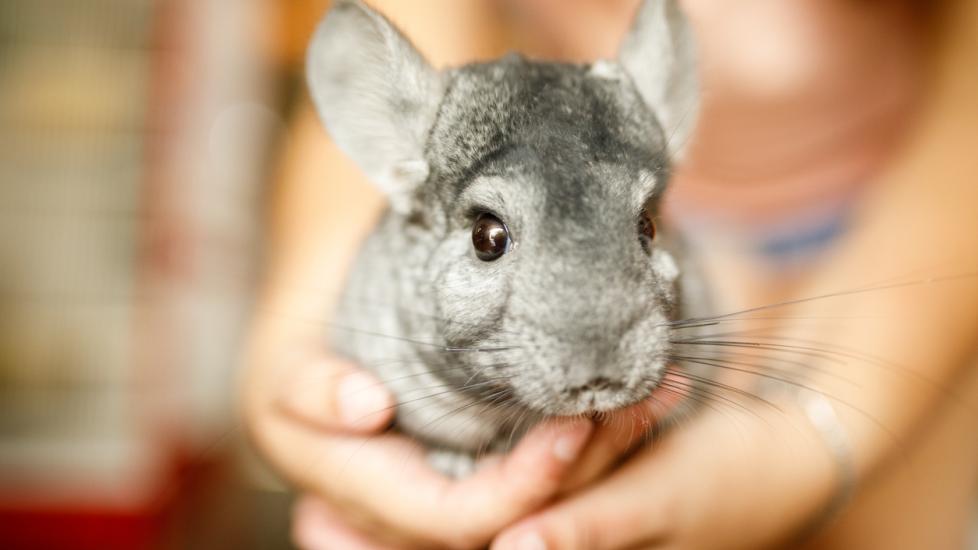Choking in Chinchillas
What Is Choking in Chinchillas?
Chinchillas can choke when an object becomes lodged in the esophagus. The resulting bulge in the esophagus can put pressure on the trachea, or windpipe, causing decreased ability to breathe. In some cases, the pressure from the object in the esophagus can close off the windpipe completely, causing inability to breath and eventually suffocation. Choking is a life-threatening emergency that can affect a chinchilla at any time.
Symptoms of Choking in Chinchillas
-
Anorexia (refusing to eat)
-
Difficulty swallowing
-
Lethargy
-
Excessive drooling
-
Bulging esophagus
-
Gagging, retching, or coughing sounds
-
Discharge of saliva or food material from the nose
-
Anxious behavior
-
Pawing at the mouth
-
Gasping or open mouth breathing
Causes of Choking in Chinchillas
The most common cause of choking in a chinchilla happens when they try to swallow something that is too large to pass through the esophagus. This is usually a food item such as nuts, dried fruit, or a coarse pelleted food that expands once chewed. Chinchillas can also choke on non-food items they may find. In addition, breeding females will sometimes choke on the placenta they consume after giving birth.
Chinchillas, like other rodents such as rats and guinea pigs, cannot vomit. Their digestive system is only designed for food to go down, not back up. This is largely because the diaphragm that pushes on the stomach to cause vomiting in other animals is not strong enough to do so in chinchillas.
Improper diet can also lead to a choking episode. Since chinchilla teeth continuously grow, they need plenty of hay to chew and grind their molars down. Without enough roughage, the molars can overgrow causing an inability to chew food or treats into manageable pieces.
How Veterinarians Diagnose Choking in Chinchillas
If you suspect your chinchilla is choking, bring him to a veterinarian right away. It is important to keep him calm and minimize stress on the way to the vet, so it's best to place your chinchilla in a small animal carrier for transport. During the physical exam the veterinarian will assess your pet's ability to breathe and feel the throat for a bulge in the esophagus. X-rays may be recommended to see exactly where the object is lodged. Sometimes a radio opaque liquid can be administered as well to highlight the path of the digestive tract and look for blockages.
Your veterinarian may also recommend bloodwork to assess your chinchilla's general health. This can help determine how debilitated he may be and what kind of supportive care and treatment he needs for a successful recovery.
Treatment of Choking in Chinchillas
Once the location of the obstructing object has been determined, your veterinarian will attempt to remove it. Anti-spasm medications can be administered to relax the esophageal muscles. Flushing the esophagus with water and lubricant may dislodge the blockage, or it can be manually removed with forceps. In some cases, general anesthesia and surgical removal may be necessary.
Antibiotics and digestive stimulating medications are often prescribed for chinchillas after they have a choking episode. Antibiotics will treat pneumonia that may form when food is aspirated into the respiratory tract. Gastro-intestinal motility stimulants are often used to restart the regular motion of the digestive system that was stalled during the blockage.
If your chinchilla has overgrown teeth that make it difficult for him to chew his food, your veterinarian may recommend a sedated dental procedure to address the issue. Overgrown teeth can be trimmed with specialized dental instruments, or they can be ground down with a Dremel tool.
Recovery and Management of Choking in Chinchillas
A chinchilla recovering from a choking incident needs to rest in a quiet and calm environment. Handling should be kept to a minimum (except to feed or give medications) until he is eating well and acting normal again. His bedding should be soft, made of small pieces that won't cause choking if he ingests it, such as Carefresh small animal bedding. Wood based bedding like pine or cedar shavings should be avoided.
As always, make sure plenty of fresh hay is available, and pelleted foods may need to be mashed or softened with water to allow easier swallowing. Additional foods or treats should be cut into small pieces to avoid choking again. If your chinchilla is not eating on his own, syringe feeding with a nutritional formula like Oxbow Critical Care may be necessary. In some cases, a nasogastric tube may be placed for liquid feedings and easier administration of medications.
Monitor your chinchilla closely during his recovery from choking. Some chinchillas experience complications after a choking episode such an esophageal rupture or a stalled digestive tract.
He should be producing regular stools and cecotropes. If you notice your chinchilla has not eaten or had a bowel movement in a 12-hour period he should be re-evaluated by a veterinarian.
Choking in Chinchillas FAQs
Is choke in chinchillas an emergency?
A blockage in the esophagus that causes a chinchilla to choke will often put pressure on the trachea, or windpipe. Choking in chinchillas is always an emergency situation because there is potential for the airway to become obstructed,
What do I do if my chinchilla is choking?
If your chinchilla is showing signs of choking, keep him calm and quiet and bring him to a veterinarian right away.
Can I prevent choke in chinchillas?
Choking can be prevented by feeding a proper diet with lots of hay, limited pellets, and very small pieces of food or treats. Always supervise your chinchilla when he is out of his cage to ensure he doesn't chew on inappropriate objects.
Featured Image: iStock.com/Capuski
Help us make PetMD better
Was this article helpful?
